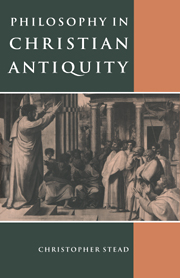Summary
Christian theology begins with the New Testament. The earliest Christians, it shows us, were ready to expound the Scriptures and to defend their faith in Jesus against Jewish and pagan opponents. But before long they faced the new task of expressing their beliefs in a way that well-educated pagans could understand and appreciate. And as the Christian movement expanded, new expressions of the faith were devised, and had to be examined and approved so that as far as possible disagreements and misconceptions could be avoided. The great development of early Christian theology took place in the three hundred years extending from the mid-second century to the Council of Chalcedon in 451: the age of Irenaeus, Origen, Athanasius and Augustine.
At this time the various schools of philosophy gave their adherents many of the benefits we now expect from religion. The conventional state religion was often little more than a formality; the so-called ‘mystery cults’ offered comfort and reassurance, but provided no explanations and made few demands; the worshipper could enter one, two or several such fellowships as he wished. The Jews had largely detached themselves from the main stream of ancient culture. It was the philosophers who both called for commitment and presented a way of life based on a rational view of the world and man's place within it.
- Type
- Chapter
- Information
- Philosophy in Christian Antiquity , pp. ix - xiPublisher: Cambridge University PressPrint publication year: 1994
- 1
- Cited by

